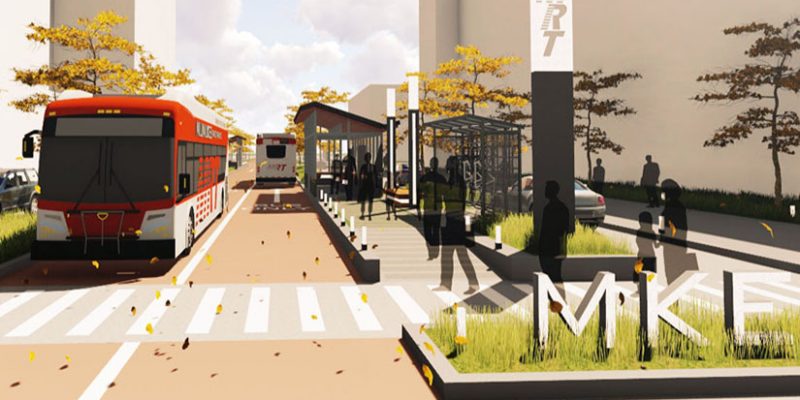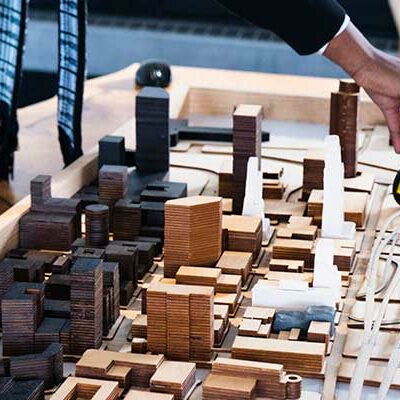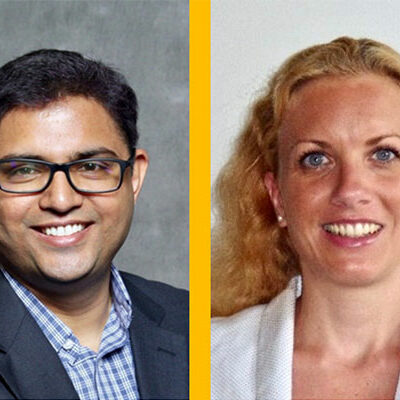What Is Urban Planning?
Urban planning is the profession that concerns itself with the health and quality of life of urban places—cities and their suburbs, small towns and rural villages. Urban planners care for cities as different as New York City and Boscobel, Wisconsin. Keeping cities healthy and vibrant requires urban planners to work with the transportation system, the economy, the environment, urban design and physical facilities, and the culture and politics of a city to maintain (or restore) the quality of life. Planning is future-oriented, a profession that creates both short and long term visions balanced with market and cultural influences. Planners look five, twenty, and even fifty years into the future to anticipate the future consequences of current trends and activities, and to ensure present actions enhance the quality of life in the city.
Given the diversity of our profession, urban planners do a great variety of things. “The most important role for the planner is to work with the public to identify a community’s goals, then help to marshal stakeholders—community organizations, developers, and elected officials—to accomplish them” (Marjorie Macris, former director of planning for the City of Berkeley, CA, quoted in Planners on Planning by Bruce McClendon and Anthony Catanese).
The planner’s special niche, however, concerns problems with a spatial (or geographic) dimension. Almost all of the work planners do concerns the idea of place. Planners shape the physical layout of cities by zoning specific areas for different types and intensity of development (residential, commercial, industrial; high-rise, low-rise) and working with engineers and architects to plan for the location of major public facilities, such as transportation corridors and utilities. Planners also work to preserve and improve the spatial and visual character of places.
Urban planners anticipate how a city will function and how it will look as it develops (or redevelops) in the future. Urban planning is about possibilities. Planners anticipate how a series of buildings will fit together aesthetically; how they will be linked to the infrastructure of streets, sewers, water lines and electricity; how will they fit into the local economy and what the demand will be for the types of services provided by the buildings that get built. Planners also engage with community power structures to ensure the city develops in ways that produce prosperity, sustainability, and social equity. Who are the potential users of the buildings and the spaces between the buildings? Does the entire community benefit from the development? How will users get to and from the area? How will the presence of the buildings affect the natural environment of the area? How will the development as a whole affect the neighborhood residents in terms of job opportunities, shopping options, noise, community character, and cost of living?
Finally, planners communicate. Professional planners have no legal authority to put their plans into effect. Everything a planner proposes will get done only if the planner persuades others that it is the right thing to do. Planners need to communicate in language understandable to many different types of people with different values and experiences, and planners help different groups communicate with one another. Twenty-first century planning relies on partnerships to develop a community’s vision for the future and implement actions to bring the vision to life.
The day to day activities of a planner take them from their offices to the “field” and to meetings of many types. At the office, the planner reviews maps and drawings, makes calculations using tools like spreadsheets, writes memoranda and reports, and responds to inquiries from citizens, developers, and public officials. Planners also spend time in the field, taking surveys, talking with citizens, and observing physical situations. Planners also meet with and present to planning commissioners (citizens who are appointed to the planning board in the community) and neighborhood groups. During major planning projects, such as a comprehensive plan or a corridor study, the planner will coordinate public meetings.
As one might expect from the terms “urban planner” and “city planner,” the majority of planners work for municipalities, and that alone covers a lot of ground. Planners work in the central cities of metropolitan area cities such as New York, Boston, Sacramento, New Orleans, and Indianapolis; they work in suburbs large and small within metropolitan areas. They also work in medium-sized and smaller cities that serve as the hub of activity for a larger rural area. Planners also work in county government, for regional planning agencies, and in state government.
A significant number of planners work in the private sector as well. As a planning consultant, your clients are primarily cities and counties that need additional professional assistance with special planning projects or problems, or developers needing assistance with their project. Here are some additional examples of the settings where one may find planners working:
- Architecture firms hire planners to help them design more functional neighborhoods.
- Banks hire planners to assist them in making community investment decisions.
- Economic development agencies hire planners to help them better understand the linkages between public policies and employment and to better communicate with employers about the competitive advantages of specific locations.
- Non-profit community organizations hire planners to operate housing, mortgage assistance, or economic development programs.
- Real estate developers hire planers to help them negotiate development terms that meet the developer’s needs while addressing the concerns of neighborhoods and city councils.
- School districts hire planners to help with resource allocation decisions or initiatives dealing with new approaches to service delivery.
- Transportation agencies (such as state highway departments and local transit agencies) need urban planners to help them better integrate proposed transportation improvements (whether highways, transit, or bike facilities) with new residential and commercial development.
Because of the work planners do, a city functions more smoothly. Housing is more affordable and of higher quality. Commercial areas have more vitality. Jobs are more plentiful and pay better. People waste less time in traffic congestion. Taxes are lower. Parks are greener and more spacious. Residents and visitors enjoy better lives. Life is beautiful!
OK, maybe this is an exaggeration, but it serves to suggest the kinds of impacts that planners have. Planners always work in coordination with other professionals, with residents, businesses, and local officials to plan and implement policies and programs that are expected to lead to the kinds of positive impacts described above.
Sometimes, the interests of residents may be at odds with the desires of businesses and developers. Planners have an ethical responsibility to use their profession expertise, communication acumen, and influence to advocate for the public interest, with “special a special responsibility to plan for the needs of disadvantaged groups and persons” (American Planning Association).
An excellent resource for learning about planners from planners is the book Becoming an Urban Planner by Bayer, Frank, and Valerius. Bayer and Valerius are alumni of the UWM urban planning master’s program. Frank is a faculty member in the planning program at UWM.
- Alyse Getty, Project Manager, Parsons Infrastructure and Technology, Inc., Norcross, Georgia
- Shannon Yadsko, AICP, Planner, PB PlaceMaking, Washington, D.C.
- John Hodges-Copple, Triangle J Council of Governments:
- Amy Bonitz, Principal, Bonitz Palmer LLC, Baltimore, Maryland
“My consulting experience has afforded me the opportunity to work on a wide range of project types, with a wide range of scientific experts, engineers, specialists, and planners. My project teams are all multi-disciplined, and every project teaches me new lessons on the strengths and weaknesses a team brings to a project. Scientists, engineers and planners do not process information in the same manner. The greatest challenge is often finding the common denominator, and getting a project team working as a team when you have so many professional approaches that are part of the mix.”
“I was very math- and science-oriented growing up and entered college in a civil engineering program. However, after a year, I felt like I wasn’t being creative enough, so I switched to the architecture school, where eventually I felt like I wasn’t being analytical enough. But there I learned of urban planning and found it to be the perfect balance of analysis and creativity. After taking an Intro to Planning course, I knew I had found what I was meant to do.”
“The usual answer is “to make the world a better place” and that would be my answer too (not too creative, I admit, but sincere), except I would substitute “community” for world. I grew up in Alexandria, Virginia, and loved everything political. The democratic process (the one with the little “d”) is an open, organized way to foster debate and bring about change that can benefit many. I am fascinated by the physical realm too and how people use space.”
“My experience working in poor urban neighborhoods with the design center taught me that you achieve a better end result if you value everyone’s input in the design and planning process. I also think it ignited my drive to understand why the market just abandons some neighborhoods and to learn strategies to bring new investment to inner cities. By working for an urban developer I have seen the power of transformative projects where overlooked assets were turned into dynamic new places that catalyzed investment and changed the civic mindset about what is possible.”
The American Planning Association, an organization of practicing planners, also provides a wealth of information to individuals interested in a career in planning, and information specifically related to career planning can be found at http://www.planning.org/aboutplanning/.
Download a brochure from the Association of Collegiate Schools of Planning,
“Choosing a Career In Urban Planning”


